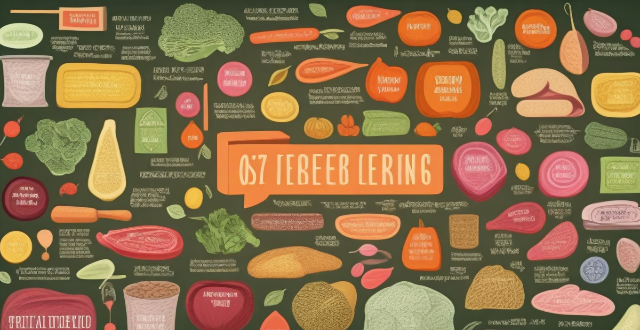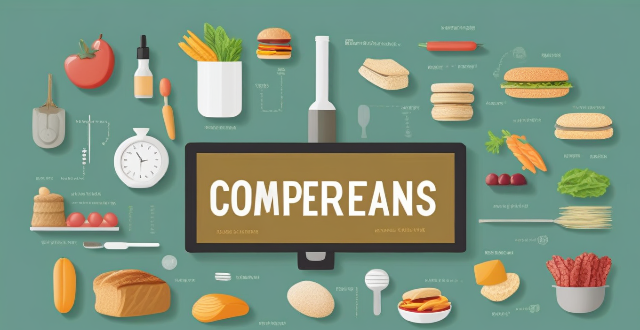Food Product

Can you explain the difference between "use by" and "best before" dates on food products ?
Food products are labeled with "use by" and "best before" dates to indicate quality and safety. A "use by" date is for perishables like meat and dairy, ensuring safety after a certain time, while a "best before" date is for non-perishables like canned goods, indicating when the product will maintain optimal quality. Consuming food after its "use by" date risks foodborne illness, but consuming after "best before" may just affect taste and nutrition. Understanding these labels helps ensure food safety and quality.

Is it worth paying extra for organic food ?
Organic food has become increasingly popular in recent years, with many people opting to pay extra for these products. In this article, we explore the benefits and drawbacks of organic food to help you make an informed decision. Benefits of Organic Food: - Healthier and more nutritious, with no pesticides or chemicals and higher nutrient content. - Environmental impact is reduced through sustainable farming practices that promote soil health and reduce pollution. - Animal welfare standards are higher, with better living conditions for animals and no antibiotics or hormones used in meat and dairy products. Drawbacks of Organic Food: - Higher cost due to higher production costs and limited availability in some areas. - Quality consistency can be inconsistent, with no guarantee of high quality in every product. - Shorter shelf life can lead to waste if not consumed quickly enough. Whether or not it is worth paying extra for organic food depends on personal preferences, budget constraints, and availability. Consider your own priorities and make an informed decision based on those factors.

How does food labeling contribute to food safety ?
Food labeling is crucial for food safety as it provides consumers with essential information. It includes ingredient lists, nutritional information, expiration dates, manufacturing details, storage instructions, certification marks, allergy warnings, country of origin, precautionary statements, and environmental impact information. Proper labeling practices help identify ingredients, understand nutritional values, recognize potential risks, and make informed decisions about food consumption.

What are the benefits of using the new product ?
Benefits of Using the New Product: - Improved Efficiency: Streamlined tasks, automation, integration with other tools, and a simplified interface save time and work more efficiently. - Enhanced Performance: Advanced technologies and algorithms enable faster and accurate processing, leading to improved productivity and higher quality outputs. - Customization Options: Extensive customization options allow users to tailor the product to their specific needs and preferences, creating a personalized experience. - Scalability and Flexibility: The product is designed to be scalable and flexible, making it suitable for both small businesses and large enterprises, and can accommodate growing demands and changing requirements.

In what ways do product reviews differ across various industries ?
Product reviews play a crucial role in shaping consumer behavior, and their impact can vary significantly across different industries. Here's a detailed exploration of how product reviews differ across various sectors: 1. Electronics and Gadgets: Reviews often delve into the technical aspects, comparing features with other products in the market. Users frequently comment on processing speed, battery life, and overall functionality. There's a keen focus on whether the product offers good value in relation to its price point. 2. Fashion and Apparel: Reviews emphasize how clothing items fit, discussing sizing accuracy and any adjustments needed. The feel and durability of fabrics are common topics of discussion. Aesthetic appeal is paramount, with comments on design, color, and overall look. 3. Food and Beverages: Reviews center around taste, often describing flavors and textures. For packaged goods, comments may touch on the quality of packaging and product freshness upon arrival. Health-conscious consumers discuss calorie content, ingredients, and nutritional benefits. 4. Automobiles: Reviews cover engine power, fuel efficiency, and handling. Interior comfort, infotainment systems, and safety features are evaluated. Long-term reliability and maintenance issues are key concerns. 5. Health and Beauty: Results achieved from using beauty or health products are a primary focus. Reviews may mention skin reactions or other adverse effects. Ease of use and product consistency (e.g., lotion thickness) are discussed. 6. Sports and Outdoor Equipment: How equipment holds up under various conditions is a central topic. Whether gear improves athletic performance is often debated. Especially for wearable items, comfort and proper sizing are crucial. 7. Home and Garden: For furniture or appliances, the assembly process is often reviewed. How well a product performs its intended function is evaluated. Aesthetic suitability for home environments is considered. 8. Software and Digital Products: User interface design and ease of navigation are key points. The range of features and tools offered by software is analyzed. Reviews might discuss compatibility with different devices or operating systems. 9. Baby and Childcare: Safety features and certifications are of utmost importance. Parents appreciate products that are straightforward to use while managing children. Withstands wear and tear from child usage is a significant factor. 10. Pet Supplies: Some reviews will discuss if the pet enjoys using the product. For consumables, ingredient quality is scrutinized. Toys and equipment must withstand rough play and potential chewing.

How do I read and understand organic food labels ?
Organic food labels can be confusing, but understandingOrganic food labels can be confusing, but understanding informed decisions about what you eat This certification ensures that the product has been grown and processed according to strict federal guidelines. 2. Check the List of Ingredients: Look for words like "organic," "made with organic ingredients," or "100% organic." These phrases indicate that the product has been made with organic ingredients. 3. Watch Out for Marketing Terms: Be wary of terms like "natural," "free-range," or "cage-free." Always look for the USDA Organic seal or other certifications that ensure the product meets specific standards. 4. Consider the Pesticide Residue: Even if a product is labeled as organic, there may still be some pesticide residue present. Look for products that are certified as "pesticide-free" or "certified organic." 5. Check for GMOs: Genetically modified organisms (GMOs) are not allowed in organic products. Make sure the product is labeled as "non-GMO" or "certified organic." 6. Read the Nutrition Facts Panel: Don't forget to read the nutrition facts panel on the back of the package. This will give you information about the product's calorie content, fat content, and other nutrients. Choose wisely based on your dietary needs and preferences.

How can consumers check if their food is safe to eat ?
Consumers can check if their food is safe to eat by checking expiration dates, looking for signs of spoilage, reading labels carefully, practicing proper food handling, and using a food safety app.

How are food safety regulations enforced by governments ?
Governments around the world enforce food safety regulations through various methods, including legislation and policy development, inspection and compliance checks, licensing and certification, education and training, penalties and enforcement actions, public communication, and international cooperation. These efforts aim to protect consumers from harmful substances and contaminants in food products while promoting fair trade practices among producers and retailers.

How can I identify if a product is truly climate-friendly ?
To identify if a product is truly climate-friendly, consider factors such as certifications and standards, packaging materials and amount, the manufacturer's sustainability practices, product lifespan and repairability, end of life options, customer reviews, and be wary of greenwashing.

How do product reviews influence consumer purchasing decisions ?
Product reviews significantly impact consumer purchasing decisions by providing trustworthiness, social proof, detailed information, risk mitigation, influencing perception, and driving engagement. They offer authenticity, objectivity, peer influence, detailed product information, comparison shopping, reduced uncertainty, brand image enhancement, price justification, community building, and a feedback loop for product improvement. Businesses should focus on high-quality products and customer service to ensure positive reviews and boost sales.

How do I know if a product is truly gluten-free ?
Gluten-free products are becoming increasingly popular, but it's important to know how to identify whether a product is truly gluten-free. Here are some tips: 1. Check the Label 2. Look for Certifications 3. Read the Ingredient List 4. Be Wary of Cross-Contamination 5. Trust Reputable Brands 6. Ask Questions

How can small food businesses ensure they are compliant with food safety regulations ?
The text provides a comprehensive guide on how small food businesses can ensure compliance with food safety regulations. It emphasizes the importance of compliance in protecting consumer health, avoiding legal consequences, and enhancing brand reputation. The steps for ensuring compliance include understanding the regulations, training staff, implementing GMP, using quality ingredients, monitoring and testing, and having a plan for non-compliance. Following these steps can help small food businesses meet legal requirements and assure customers of the highest standards in food safety, ultimately leading to customer loyalty and a strong brand reputation.

How do I choose the right financial product for my retirement plan ?
Retirement planning is crucial for a secure future, and choosing the right financial product is key. Assess your retirement goals, evaluate your risk tolerance, determine your time horizon, research available products like stocks, bonds, mutual funds, ETFs, real estate investments, and annuities, and seek professional advice to make informed decisions.

What role do food safety audits play in ensuring food quality ?
Food safety audits play a crucial role in ensuring food quality, identifying potential hazards and risks, ensuring compliance with regulations and standards, and maintaining customer trust. Companies should prepare for audits by reviewing relevant documents, conducting on-site audit activities, and following up with action plans to address any identified issues. By prioritizing food safety audits, companies can build a strong reputation for producing safe and healthy products, leading to increased customer loyalty and sales.

What inspired the development of the new product ?
The development of a new product is inspired by identifying a problem or opportunity in the market, followed by extensive research and analysis to understand market dynamics, target audience, and competition. Brainstorming sessions generate ideas for the product, which are then assessed for feasibility in terms of technology, finances, and operations. The design and development phase focuses on aesthetics, engineering, and iterative testing. A marketing strategy is crucial for success, including positioning, promotion, and pricing. Launch preparation involves supply chain management, sales channels, and customer support. Finally, post-launch activities monitor sales, collect customer feedback, and analyze market response. Each step builds upon the previous one to bring a unique solution to life that addresses specific needs or desires within a target market.

What are the benefits of video product reviews versus written ones ?
Video product reviews offer enhanced visual appeal, improved clarity and understanding, increased engagement and retention, greater accessibility and shareability, and building trust and credibility compared to written ones. They showcase the product in action, demonstrate features effectively, provide context, address common questions, engage viewers with interactive elements, are accessible on multiple devices, shareable on social media platforms, include accessibility features, establish rapport with audiences, showcase expertise, and add a personal touch.

Where can I buy the new product ?
The text provides a topic summary on where to purchase the new product, discussing various online and physical store options. Online retailers include Amazon, eBay, and the official website, each with its pros and cons such as wide selection, competitive pricing, potential savings, and guaranteed authenticity. Physical stores like local electronics stores, department stores, and specialty retailers offer advantages such as seeing the product before purchasing, one-stop shopping, and expert staff knowledge. The summary also includes considerations when purchasing, such as authenticity, warranty & support, price comparison, shipping & returns, and reviews & ratings.

How do I read food labels to ensure I'm making healthy choices ?
To make healthy food choices, understanding food labels is key. Start by checking the serving size and calories per serving. Examine the nutrients listed, including macronutrients, sugar content, and fiber. Look for essential vitamins and minerals. The ingredient list tells you what the product contains, so avoid unnecessary additives. Pay attention to the % Daily Value, focusing on key nutrients like sodium and fat. Check for certifications and understand marketing claims. If you have allergies, check the allergen list and look for warning labels. Finally, check the expiration date. By reading food labels carefully, you can make healthier choices that align with your dietary needs and preferences.

How do product reviews influence the development of new products ?
## Topic Summary: The Influence of Product Reviews on New Product Development Product reviews are a valuable resource for companies in the development of new products. They provide direct feedback from customers, helping to identify customer preferences, pain points, and emerging trends. By analyzing these reviews, companies can make informed decisions about product design, features, and improvements. Additionally, positive reviews can enhance brand trust and credibility while marketing strategies can be tailored based on customer segments. Companies should prioritize collecting and analyzing product reviews as part of their overall product development process.

Will there be any promotions or discounts for the new product ?
Will there be any promotions or discounts for the new product? The answer depends on various factors such as market strategy, competitive landscape, financial considerations, and timing. Marketing plan, target audience, competitor analysis, market share, profit margins, sales goals, product launch timing, and inventory management are all key factors to consider. It is essential to keep an eye on these factors to determine if there will be any promotions or discounts available for the new product.

How can consumers spot misleading or false product reviews ?
Product reviews play a crucial role in the decision-making process of consumers. However, with the rise of e-commerce, there has been an increase in misleading or false product reviews. As a consumer, it is essential to be able to identify these reviews to make informed purchasing decisions. In this article, we will discuss some tips and strategies to help you spot misleading or false product reviews.

How do online shopping sites rank in terms of product variety ?
This article discusses the ranking of online shopping sites based on product variety, considering factors such as selection, pricing, customer service, and quality control measures. The top five sites are: 1) Amazon with a vast selection across multiple categories; 2) eBay offering unique items through bidding or direct purchase; 3) Walmart providing competitive prices and convenient delivery options; 4) Target offering diverse products with free shipping on eligible orders; and 5) Best Buy specializing in electronics with detailed product descriptions.

What role does social media play in product review dissemination ?
The article discusses the significant role of social media in product review dissemination. It highlights the concept of "social proof" where people trust and adopt a product seeing others using it and sharing positive reviews. Social media platforms provide a platform for users to share their experiences with products, both good and bad, which can greatly influence potential customers' purchasing decisions. User-generated content (UGC) is a powerful tool for brands looking to promote their products. By encouraging customers to share their experiences with a product on social media, brands can leverage the power of social proof to attract new customers. Influencer marketing is another way that social media affects product review dissemination. Brands partner with influencers who have large followings on social media platforms to promote their products. Online reviews have become an essential part of the purchasing process for many consumers. Social media platforms provide a space for users to share their thoughts and opinions about products, allowing potential customers to make informed decisions before making a purchase. The trustworthiness, variety of opinions, and timeliness of online reviews greatly impact a consumer's decision to purchase a product or not. In conclusion, social media plays a crucial role in product review dissemination by providing a platform for users to share their experiences with products, promoting user-generated content and influencer marketing, and facilitating the sharing of online reviews.

How do climate-related concerns influence consumer choices in the food industry ?
Climate change is a pressing issue that affects various aspects of life, including the food industry. As consumers become more aware of their environmental impact, they are increasingly making choices based on climate-related concerns. This shift in consumer behavior has significant implications for food producers, retailers, and the entire supply chain. Factors influencing consumer choices include environmental sustainability, health considerations, economic factors, ethical concerns, personal values and beliefs. The impact on the food industry includes product development, supply chain management, marketing strategies, retail practices, and policy influence. Businesses that adapt to these changing preferences by embracing sustainability and transparency are likely to gain a competitive edge in the marketplace. It is essential for companies to anticipate and respond to these trends to maintain relevance and profitability while contributing positively to the environment.

What are the most reliable sources for product reviews ?
The text provides a comprehensive overview of the most reliable sources for product reviews. It discusses various platforms such as Consumer Reports, Amazon Customer Reviews, Professional Blogs and Websites, YouTube Influencers, Independent Forums and Discussion Boards, and Manufacturer Websites and User Manuals. Each source is described in terms of its reliability, coverage, and pricing. The text emphasizes the importance of consulting multiple sources and cross-referencing information to make informed purchasing decisions and avoid biased or fake reviews. Overall, the text offers valuable insights into finding trustworthy product reviews and making well-rounded understanding of a product's performance and quality.

What is a food recall and how does it relate to food safety ?
Food recalls are a crucial part of ensuring that consumers have access to safe and nutritious foods. When a product is recalled, it means that there is a potential risk associated with consuming it, which could lead to illness or injury. There are several reasons why a food recall may be issued, including contamination, mislabeling, and manufacturing defects. The steps involved in carrying out a food recall include identification, notification, public announcement, removal from shelves, investigation, and corrective action. By understanding the reasons behind food recalls and the steps involved in carrying them out, we can all do our part to promote food safety and support healthy communities.

How do negative product reviews affect a company's reputation ?
Negative product reviews can have a significant impact on a company's reputation, affecting everything from sales and profits to employee morale and customer loyalty. Here are some ways in which they can affect it: 1. Loss of Trust: Negative reviews can erode the trust that customers have in a company, making them less likely to do business with them in the future. It can also make potential new customers hesitant to try the company's products or services. 2. Decreased Sales: Negative reviews can lead to decreased sales as customers may be discouraged from purchasing the product. This can result in lost revenue for the company, which can ultimately harm its financial stability. 3. Damage to Brand Image: Negative reviews can damage a company's brand image, making it harder for them to attract new customers or retain existing ones. It can also make it more difficult for the company to launch new products or expand into new markets. 4. Loss of Market Share: If a company's reputation is damaged by negative reviews, it can lose market share to competitors who have better reviews and reputation. This can lead to a decline in profits and potentially even bankruptcy if the company is unable to recover. 5. Difficulty Hiring Talent: Negative reviews can make it harder for companies to attract top talent, as potential employees may be wary of working for a company with a poor reputation. This can limit the company's ability to grow and innovate, further damaging its reputation and financial stability. In conclusion, it is essential for companies to take steps to address negative reviews and work to improve their overall reputation to avoid these consequences.

What factors should be considered before choosing a celebrity to endorse a product ?
Before selecting a celebrity to endorse your product, itBefore selecting a celebrity to endorse your product, it several factors that can impact the it's crucial to consider several factors that can impact the success of your marketing campaign. These include the celebrity's image and reputation, target audience demographics and cultural relevance, popularity and influence, market research, cost versus benefit analysis, chemistry between brand and celebrity, and legal and ethical considerations. By carefully weighing these factors, you can select a celebrity endorser who will enhance the perceived value of your product and resonate with your intended customer base, ultimately driving brand awareness and sales.

How do I know if a product is truly organic ?
Identifying truly organic products requires looking for certification labels, checking the ingredient list, researching the manufacturer or brand, and visiting farmers markets and local stores. Certification labels such as USDA Organic, Euro-leaf, and JAS indicate that the product meets specific standards for organic production. The ingredient list should indicate that all ingredients are organic and free from GMOs. Researching the manufacturer or brand can provide information about their farming practices and quality control processes. Visiting farmers markets and local stores allows you to ask questions about the products and see them firsthand. By following these tips, you can ensure that you are getting genuine organic products that are free from harmful chemicals and pesticides.

How much do celebrities typically get paid for endorsing a product ?
Celebrity endorsements are a common marketing strategy used by brands to promote their products or services. The amount of money that celebrities earn from endorsements can vary widely depending on several factors, including the celebrity's popularity, the type of product being endorsed, and the length of the contract. In this article, we will explore some of the key factors that determine how much celebrities typically get paid for endorsing a product.